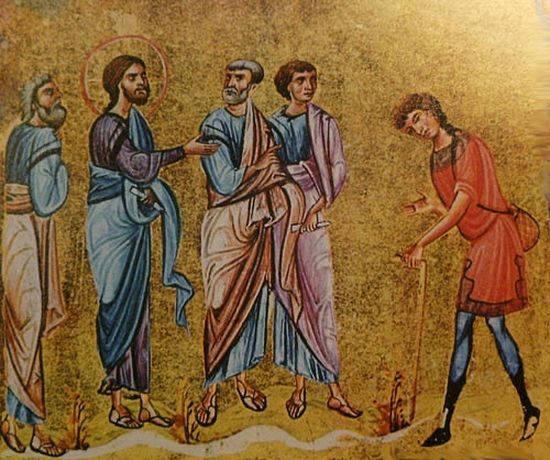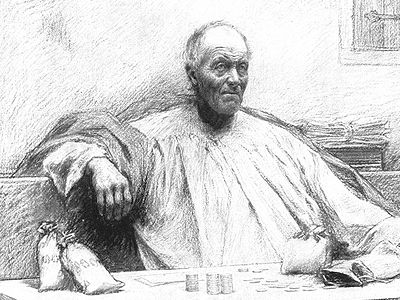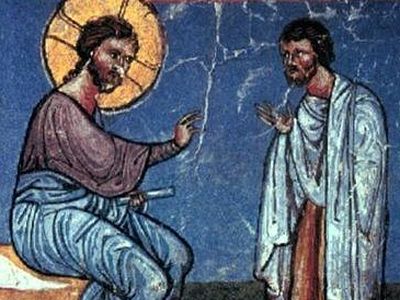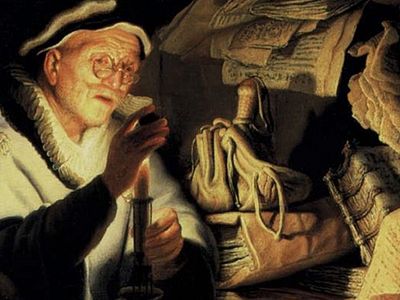Source: Notes on Arab Orthodoxy
November 29, 2016
A rich young man asks Jesus, "What should I do to inherit eternal life?" The Lord responds, "In order to enter the kingdom of heaven, you must keep the commandments," and He listed some of them. The young man said, "I have fulfilled these since my childhood," as though he was searching for something else in order to enter the kingdom of his Lord, which this new Teacher came to proclaim in Galilee and Samaria and to the ends of the earth. Then Jesus replied, "You lack one thing: that you sell everything you have and give it to the poor. Then, come and follow Me."
What does this mean, "Sell everything you have and give it to the poor"? Does it mean that the rich must sell their homes and possessions? What do these words mean? Jesus didn't compromise with anyone. He explicitly stated to the rich young man that that it is hard for the rich to enter the kingdom of God. He then continued firmly, "It is easier for a camel to pass through the eye of a needle than for a rich man to enter the kingdom of God." The Lord placed us before a great difficulty that we cannot downplay. The Gospel is not negligible. It is difficult and we must storm into the difficulty and understand how we can be saved despite the difficulty.
The needle means a needle and not anything else. So the Lord made a comparison and said that the camel-- and we can read it [in Arabic] as the very thick rope used to pull ships-- does not enter the eye of the needle. However we interpret it and however we read it in Arabic or Greek, it means at the very least that it is very difficult for the rich to enter the kingdom of God.
So what should we do, then? God said through David, "He has dispersed abroad, he has given to the poor; his righteousness endures forever; his horn will be exalted with honor" (Psalm 112:9). That is, you cannot stay rich without sharing. The Lord's first intent is that we make people partners in the wealth with which we have been entrusted. Christianity has given this a clear interpretation through the fathers, when they said that the wealth that you have is fundamentally for all people. "The earth is the Lord’s, and all its fullness, the world and those who dwell therein" (Psalm 24:1). The wealth that you have has been delegated to you to administer it for the sake of people and their benefit. Do not monopolize it for luxury and extravagance; this is unacceptable because luxury does not make people your partners.
This means, at the very least, that one who is wealthy in terms of food, household goods and appearance should live like other people. He should not enjoy material things more than anyone else, nor should he take pleasure in an image that hurts the poor. At the very least, then, let us not would the poor with displays of luxury. At the very least, let us not live with an indecent image. You can own, but you must not enjoy, you must not take pleasure in what exceeds even what is imaginable. In the society in which you live, you must share with the people around you by giving liberally.
The Old Testament commands the believer to give a tenth of his earnings to the poor. This is no longer a command in the New Testament. In the Church, giving is not a specific number. We do not lessen what was required of the Hebrews, but rather we add to it. It is not true that it is imposed on each person who does not desire for it to be imposed upon him.
Therefore the issue is a command, a final command and not advice. It was a divine command, so that we may feel that others are our partners in God's inheritance and that they are one with us. So come, open your pocket. Open your heart. Give. Disperse. Distribute. Love the humanity to whom you give. Love the people to whom you stretch out your hand in giving. Consider the poor person to be master over you because he gave you the opportunity to give. If you walk in this way along the great and wide path of giving, if you give and disperse, do not consider yourself to be anything, but tremble because God said that it is difficult for the rich to enter the kingdom of God.





